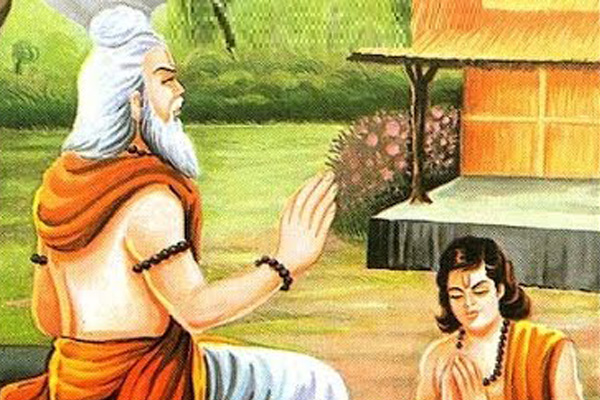Written by
mytrisanatkumar07@gmail.com
February 23, 2025
This is a continuation of our discussion in the previous blogs about Kathopanishad.
Nachiketa the student is sent by his father to Yama (the lord of death) by his father Vajashravas. As Nachiketas reaches the doorstep of the Guru i.e. Yama he comes to know that he is out on business and is not available at home. So, in order to meet him he stays at his doorstep for three nights without food and water. As Yama returns back, he is reminded as a host and the repercussions he faces if he does not attend to his duties as a host to the guest and that too who is no ordinary person but a soul who is in search of the immortal truth which the Upanishad says is a Brahmana.
This section of the Upanishad deals with the hurdles the student has to overcome to face the Guru (the teacher) and also lays down the guidelines for the guru on how to treat his student. This part of the Upanishad also deals with duties of a householder when an unexpected guest (Atithi) comes to his doorstep.
When a seeker comes in contact with the right guru, he tests the seeker’s tolerance to hardships till the seeker’s last point, this is done in order to check whether his need for spiritualistic wisdom is unwavering. The three nights spent by Nachiketas without food and water is a symbol of that. So, the real teacher tests whether the student is able to tolerate thirst, hunger and his need of self – preservation and at the same time maintain his mental in order to learn the higher truths of life. This reflects in all the lives of our Indian saints and spiritual men. They have undergone immense test of their tolerance be it psychological or physical.
The Upanishad even says that the only person who reaches at the feet of true guru is the one who has expanded his heart and mind. Meaning in a true seeker’s heart there should not be a trace of jealousy, ill feeling, selfishness and hatred with all the creatures of the planet. The seeker should be full of love towards all this creation and should consider an extension of his own self. Only such person reaches to a true Guru.
But in today’s day and age we may think is it possible? The question is not whether it is possible or not, but it is to be conscious of our actions and thoughts. That is the real teaching of the Buddha when a seeker becomes conscious in his actions and thought patterns he moves ahead in his path of self - evolution.
The Upanishad also lays down regulations to the Guru when a true student comes at his doorstep, he is requested to treat him with proper food and quench his thirst. Meaning when a surrendered student approaches a guru it is also the duty of the guru to impart all his knowledge and quench the spiritual thirst of the student.
This part of the Upanishad also lays down the basic structural rules for society in general. It is the householder’s utmost responsibility that when a guest arrives at his doorstep to treat him food and water. To take his care and make him feel at home ask about his welfare and help in whichever way he can. This also tells us that if we have knowledge about any subject and a person in search of that knowledge comes to us it is inherent on us to impart this knowledge and quench is thirst about that subject by guiding him appropriately.

Finibus fusce tempor
- Aliquam sodales donec nec viverra blandit
- Ullamcorper commodo posuere neque lobortis
- Aenean praesent pretium eu hendrerit ultrices
- Diam hac tempus cubilia consectetur senectus
- Est nullam himenaeos facilisi lorem congue vehicula
